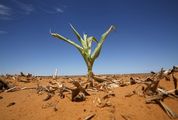Source:

Would-be suicide bombers claim to be girls kidnapped by Boko Haram
by Drew Hinshaw,
2016-03-28 14:27:50.0
A PAIR of young female would-be suicide bombers set off an international investigation over the weekend, when they were arrested at a roadblock in Cameroon, one of them drugged and both insisting they were among the 276 schoolgirls kidnapped from the town of Chibok, Nigerian officials said.
Friday’s arrest offered further testimony to how deeply involved young girls have become in West Africa’s conflict with the Boko Haram Islamist insurgency.
On Sunday, Femi Adesina, a spokesman for Nigeria’s President Muhammadu Buhari said the government was dispatching two parents from Chibok to check whether the girls are their daughters. But there was also considerable doubt: A second spokesman for the president, Garba Shehu, said the girls may have been only 10 years old, too young to number among the missing high school-aged students.
Boko Haram has kidnapped thousands of boys and girls from the northeast of Nigeria over years. The most high-profile incident occurred on April 14, 2014, when a group of Boko Haram fighters drove Toyota pickups through the gates of the Chibok Government Secondary School. Within hours, they drove off with 276 students, 57 of whom escaped in the days after.
The details of the kidnapping — the girls had been studying for their final exams — helped personalize the plight of the tens of thousands of mostly anonymous people who become victims in the Boko Haram conflict. A storm of tweets and protests across Nigeria and abroad helped inspire increased US involvement in the war, which has cost 28,000 Nigerian lives over the past five years.
Since then, the US has sent drones, manned surveillance planes, and about 300 troops to the border area of Nigeria, Cameroon, Niger and Chad, to help monitor Boko Haram — and free its hostages, including the schoolgirls.
Early on, US planes spotted two large groups of women or girls — roughly 40 in one location, and 70 in another. But the apparent hostages have since been moved and there was no proof they were the Chibok students.
In a statement, the protest group #BringBackOurGirls said it had no confirmation as to whether the girls arrested in Cameroon were, as they claimed, from Chibok. But the group offered guarded hope, saying the arrest represented the first recent lead to the girls’ locations.
More Africa news from The Wall Street Journal
More news from The Wall Street Journal
Premium access to WSJ.com: $1 a week for 12 weeks

Chibok school girls who escaped from the Boko Haram Islamists gather to receive information from officials. Only 57 girls escaped days after the attack in 2014, while 219 are still being held, despite efforts to find them. Picture: AFP
A PAIR of young female would-be suicide bombers set off an international investigation over the weekend, when they were arrested at a roadblock in Cameroon, one of them drugged and both insisting they were among the 276 schoolgirls kidnapped from the town of Chibok, Nigerian officials said.
Friday’s arrest offered further testimony to how deeply involved young girls have become in West Africa’s conflict with the Boko Haram Islamist insurgency.
On Sunday, Femi Adesina, a spokesman for Nigeria’s President Muhammadu Buhari said the government was dispatching two parents from Chibok to check whether the girls are their daughters. But there was also considerable doubt: A second spokesman for the president, Garba Shehu, said the girls may have been only 10 years old, too young to number among the missing high school-aged students.
Boko Haram has kidnapped thousands of boys and girls from the northeast of Nigeria over years. The most high-profile incident occurred on April 14, 2014, when a group of Boko Haram fighters drove Toyota pickups through the gates of the Chibok Government Secondary School. Within hours, they drove off with 276 students, 57 of whom escaped in the days after.
The details of the kidnapping — the girls had been studying for their final exams — helped personalize the plight of the tens of thousands of mostly anonymous people who become victims in the Boko Haram conflict. A storm of tweets and protests across Nigeria and abroad helped inspire increased US involvement in the war, which has cost 28,000 Nigerian lives over the past five years.
Since then, the US has sent drones, manned surveillance planes, and about 300 troops to the border area of Nigeria, Cameroon, Niger and Chad, to help monitor Boko Haram — and free its hostages, including the schoolgirls.
Early on, US planes spotted two large groups of women or girls — roughly 40 in one location, and 70 in another. But the apparent hostages have since been moved and there was no proof they were the Chibok students.
In a statement, the protest group #BringBackOurGirls said it had no confirmation as to whether the girls arrested in Cameroon were, as they claimed, from Chibok. But the group offered guarded hope, saying the arrest represented the first recent lead to the girls’ locations.
More Africa news from The Wall Street Journal
More news from The Wall Street Journal
Premium access to WSJ.com: $1 a week for 12 weeks





















Change: 1.37%
Change: 1.32%
Change: 2.91%
Change: 0.45%
Change: 3.09%
Data supplied by Profile Data
Change: 1.59%
Change: 0.47%
Change: 1.37%
Change: 0.00%
Change: 0.44%
Data supplied by Profile Data
Change: -0.02%
Change: -0.23%
Change: -0.17%
Change: 0.08%
Change: -0.34%
Data supplied by Profile Data
Change: 0.22%
Change: 0.42%
Change: 0.07%
Change: 0.36%
Change: -1.12%
Data supplied by Profile Data